Unit 17 Laughter
- 格式:docx
- 大小:28.29 KB
- 文档页数:14
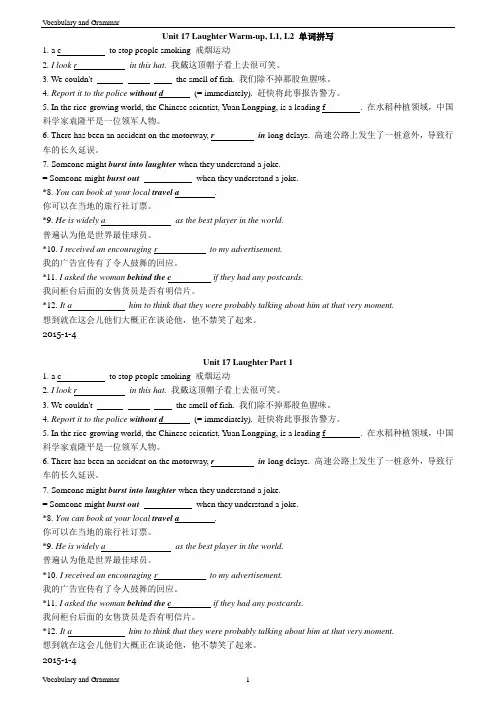
Unit 17 Laughter Warm-up, L1, L2 单词拼写1. a c to stop people smoking 戒烟运动2. I look r in this hat.我戴这顶帽子看上去很可笑。
3. We couldn't the smell of fish. 我们除不掉那股鱼腥味。
4. Report it to the police without d (= immediately).赶快将此事报告警方。
5. In the rice-growing world, the Chinese scientist, Yuan Longping, is a leading f . 在水稻种植领域,中国科学家袁隆平是一位领军人物。
6. There has been an accident on the motorway, r in long delays. 高速公路上发生了一桩意外,导致行车的长久延误。
7. Someone might burst into laughter when they understand a joke.= Someone might burst out when they understand a joke.*8. You can book at your local travel a .你可以在当地的旅行社订票。
*9. He is widely a as the best player in the world.普遍认为他是世界最佳球员。
*10. I received an encouraging r to my advertisement.我的广告宣传有了令人鼓舞的回应。
*11. I asked the woman behind the c if they had any postcards.我问柜台后面的女售货员是否有明信片。
*12. It a him to think that they were probably talking about him at that very moment.想到就在这会儿他们大概正在谈论他,他不禁笑了起来。
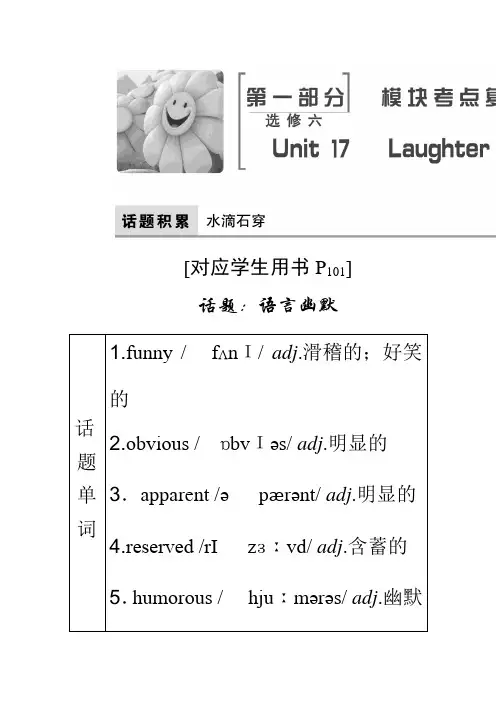
[对应学生用书P101] 话题:语言幽默[对应学生用书P102]Ⅰ.单词过关A.拼写单词1.v t. 提取;撤退2.v t. 忽视3.adj. 健忘的4.v t. 澄清,讲清楚5.n. 延误,延期6.v t. 认可,承认7.n. 人物8.v t. 骂,责骂9.v t. 禁止,不准10.v t. 得到,获得11.v i. 挨饿,饿死12.adj. 艰难的;不幸的;强壮的,强健的B.拓展单词13.politician n.政治家→adj.政治的→n.政治14.amuse v t.逗乐,使(某人)笑→n.娱乐,消遣;快乐的事→adj.娱乐的,觉得好笑的→adj.逗人笑的,好笑的15.response n.回答→v.回答,答复16.harmony n.协调,和谐→adj.和谐的,协调的17.astonish v t.使惊讶,使惊骇→adj.令人惊讶的→adj.惊讶的→n.惊奇18.resist v t.抵抗,抵制→n.抵抗,反抗,抵制→adj.抵抗的,有抵制力的19.caution n.谨慎,小心→adj.谨慎的,小心的→ad v.谨慎小心地20.convince v t.使相信→adj.令人信服的→adj.相信的,信任的C.识记单词21.agency n.22.messy adj.23.scared adj.24.campaign n.25.universal adj.26.desperate adj.27.accomplish v t.28.profession n.29.disgusting adj.30.queue v i.D.语境运用31.To our ,the famous star died.That's to say,we were at the news of her sudden death,and it was really .(astonish)32.If everyone can live in with others,our society will become more .(harmony)33.His words finally me,and I was that he was innocent.(convince)34.My mother is about knife.So she often asks us to use it with and every time she finishes using it,she often puts it away .(caution)35.It is reported that Wang Fei didn't to her divorce while her friends had different to it.(response) 答案:A.1.withdraw 2.overlook 3.forgetful 4.clarify5.delay 6.acknowledge7.figure 8.scold9.forbid10.obtain11.starve12.toughB.13.political;politics14.amusement;amused;amusing15.respond16.harmonious17.astonishing;astonished;astonishment18.resistance;resistant19.cautious;cautiously20.convincing;convinced C.21.代理;经销处22.凌乱的,肮脏的23.惊恐的;担惊受怕的24.运动25.通用的,普遍的;全世界的26.不顾一切的;绝望的27.取得(成功);完成(任务)28.职业,专业29.厌恶的30.排队D.31.astonishment;astonished;astonishing32.harmony;harmonious33.convincing;convinced;convinced34.cautious;caution;cautiously35.respond;responsesⅡ.短语排查A.短语翻译1.突然笑起来2.兑现支票3.排队4.处理掉;摆脱5.胡闹,瞎弄;虚度光阴,闲荡6.不时地7.导致,造成8.撞上;陷入9.假装;穿上;上映10.令人讨厌11.不管,不顾12.做鬼脸13.幸亏;由于14.对某人有益15.四处游戏B.选词填空(选用A中短语填空)1.Only in this way can you your headache.2.expense,we must take every measure to save the old man's life.3.I nearly a bus when it stopped suddenly in front of me.4.Speeding is a serious offence(违法行为) high fines.5.It really when he smokes at dinner.6.I was meant to be working on Sunday,but I justall day.7.It's good manners to in public places.答案:A.1.burst out laughing 2.casha cheque 3.wait in line 4.get rid of5.fool around6.from time to time7.result in8.run into9.put on10.turn sb.off11.regardless of12.pull faces 13.thanks to14.do sb.good15.play aroundB.1.get rid of 2.Regardless of 3.ran into 4.resulting in 5.turns me off 6.fooled around7.wait in lineⅢ.句式仿写1.[教材原句]Have you ever had trouble trying to spell a word?你有没有拼不出单词的时候?[仿写运用]新任总统在处理外交事务方面有很多困难。
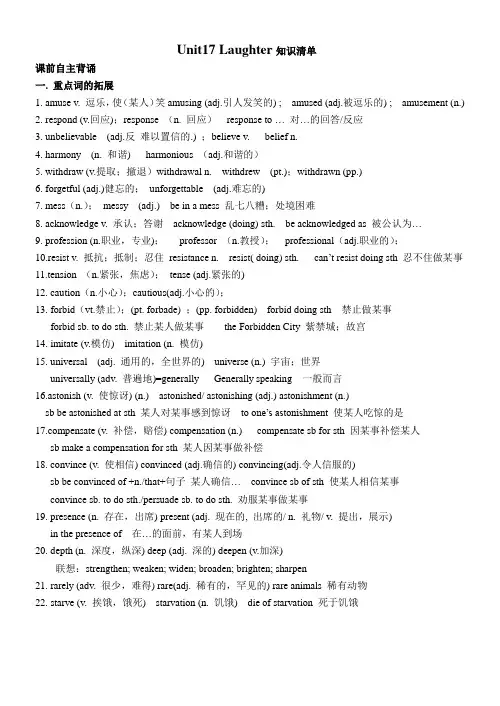
Unit17 Laughter知识清单课前自主背诵一. 重点词的拓展1. amuse v. 逗乐,使(某人)笑amusing (adj.引人发笑的) ; amused (adj.被逗乐的) ; amusement (n.)2. respond (v.回应);response (n. 回应)response to …对…的回答/反应3. unbelievable (adj.反难以置信的.) ;believe v. belief n.4. harmony (n. 和谐) harmonious (adj.和谐的)5. withdraw (v.提取;撤退)withdrawal n. withdrew (pt.);withdrawn (pp.)6. forgetful (adj.)健忘的;unforgettable (adj.难忘的)7. mess(n.);messy (adj.) be in a mess 乱七八糟;处境困难8. acknowledge v. 承认;答谢acknowledge (doing) sth. be acknowledged as 被公认为…9. profession (n.职业,专业);professor (n.教授);professional(adj.职业的);10.resist v. 抵抗;抵制;忍住resistance n. resist( doing) sth. can’t resist doing sth 忍不住做某事11.tension (n.紧张,焦虑);tense (adj.紧张的)12. caution(n.小心);cautious(adj.小心的);13. forbid(vt.禁止);(pt. forbade) ;(pp. forbidden) forbid doing sth 禁止做某事forbid sb. to do sth. 禁止某人做某事the Forbidden City 紫禁城;故宫14. imitate (v.模仿) imitation (n. 模仿)15. universal (adj. 通用的,全世界的) universe (n.) 宇宙;世界universally (adv. 普遍地)=generally Generally speaking 一般而言16.astonish (v. 使惊讶) (n.) astonished/ astonishing (adj.) astonishment (n.)sb be astonished at sth 某人对某事感到惊讶to one’s astonishment 使某人吃惊的是pensate (v. 补偿,赔偿) compensation (n.) compensate sb for sth 因某事补偿某人sb make a compensation for sth 某人因某事做补偿18. convince (v. 使相信) convinced (adj.确信的) convincing(adj.令人信服的)sb be convinced of +n./that+句子某人确信…convince sb of sth 使某人相信某事convince sb. to do sth./persuade sb. to do sth. 劝服某事做某事19. presence (n. 存在,出席) present (adj. 现在的, 出席的/ n. 礼物/ v. 提出,展示)in the presence of 在…的面前,有某人到场20. depth (n. 深度,纵深) deep (adj. 深的) deepen (v.加深)联想:strengthen; weaken; widen; broaden; brighten; sharpen21. rarely (adv. 很少,难得) rare(adj. 稀有的,罕见的) rare animals 稀有动物22. starve (v. 挨饿,饿死) starvation (n. 饥饿) die of starvation 死于饥饿二.重点短语搭配1. 突然笑起来burst out laughing/burst into laughter2. 兑现支票cash a cheque3. 排队wait in line4. 处理掉,摆脱ger rid of5. 胡闹,瞎弄fool around6. 不时地from time to time7. 导致,造成result in/lead to;由…导致result from sth;8. 撞上run into9. put on 假装/穿上,上演put up 张贴,搭起put out 扑灭put forward 提出put off 推迟put away 放好,存起来put up with 忍受put aside 放一边,保留10. turn sb off 令人讨厌turn off sth 关掉某物turn up 调大音量;出现,到场turn down 调小音量;拒绝turn over 翻转;把…移交给turn out 结果是/证明是turn to sb (for help)向某人寻求帮助11. 不管,不顾regardless of (doing) sth in spite of (doing) sth12. 四处游戏play around13. 做鬼脸pull faces14. 由于,幸亏(表原因)thanks to/ owing to/ because of/ due to sth.15. 忙于做某事sb be busy doing sth/ sb busy oneself doing sth16. 如此…以至于so+adj./adv.+that-clause;so+adj.+a/an+可数名词单数+that+clause;so many/few+复数名词+that+clause;so much/little+不可数名词+that+clause;such+a/an(+adj.)+可数名词单数+that+clause;such(+adj.)+可数名词复数/不可数名词+that+clause;三.重点句型1. have trouble/difficulty (in) doing sth. 做某事有困难2. No wonder/ It’s no wonder that...... 难怪;怪不得......3. sb. was/ were doing sth. when sh. / sth. did 正在做某事,就在这时…..sb.was/were about to do sth. when sh. / sth. did 正要做某事时,此时突然发生另一间事情4. It’s no good/use doing sth. 做某事是没有用处的。

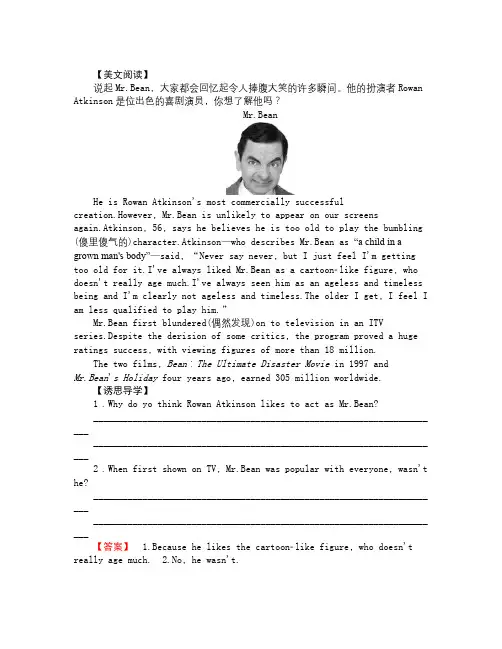
【美文阅读】说起Mr.Bean,大家都会回忆起令人捧腹大笑的许多瞬间。
他的扮演者Rowan Atkinson是位出色的喜剧演员,你想了解他吗?Mr.BeanHe is Rowan Atkinson's most commercially successfulcreation.However,Mr.Bean is unlikely to appear on our screensagain.Atkinson,56,says he believes he is too old to play the bumbling (傻里傻气的)character.Atkinson—who describes Mr.Bean as “a child in a grown man's body”—said,“Never say never,but I just feel I'm getting too old for it.I've always liked Mr.Bean as a cartoonlike figure,who doesn't really age much.I've always seen him as an ageless and timeless being and I'm clearly not ageless and timeless.The older I get,I feel I am less qualified to play him.”Mr.Bean first blundered(偶然发现)on to television in an ITVseries.Despite the derision of some critics,the program proved a huge ratings success,with viewing figures of more than 18 million.The two films,Bean:The Ultimate Disaster Movie in 1997 andMr.Bean's Holiday four years ago,earned 305 million worldwide.【诱思导学】1.Why do yo think Rowan Atkinson likes to act as Mr.Bean?____________________________________________________________________ _______________________________________________________________________ ___2.When first shown on TV,Mr.Bean was popular with everyone,wasn't he?____________________________________________________________________ _______________________________________________________________________ ___【答案】 1.Because he likes the cartoonlike figure,who doesn't really age much. 2.No,he wasn't.Period ⅠPreviewing(教师用书独具)●教学课标解读本课时主要是通过学生对学案所给出的内容的学习,了解本课文中所出现的词汇,初步了解课文以及相关的背景知识,为下一堂课对课文的全面理解起到一个铺垫作用。
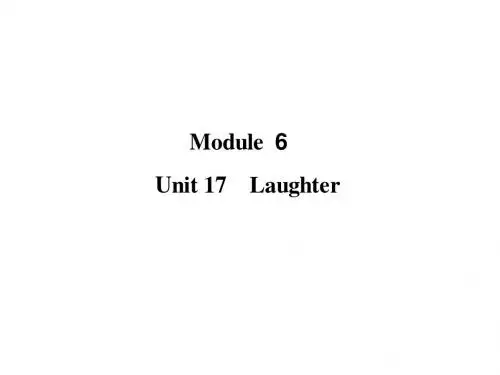
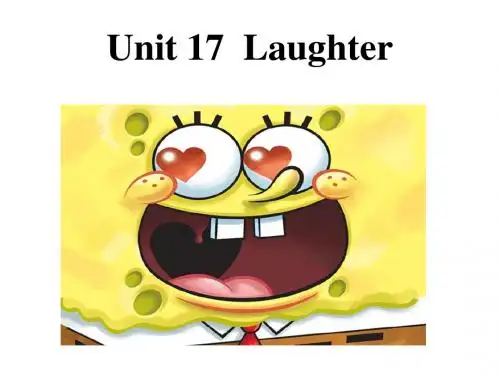
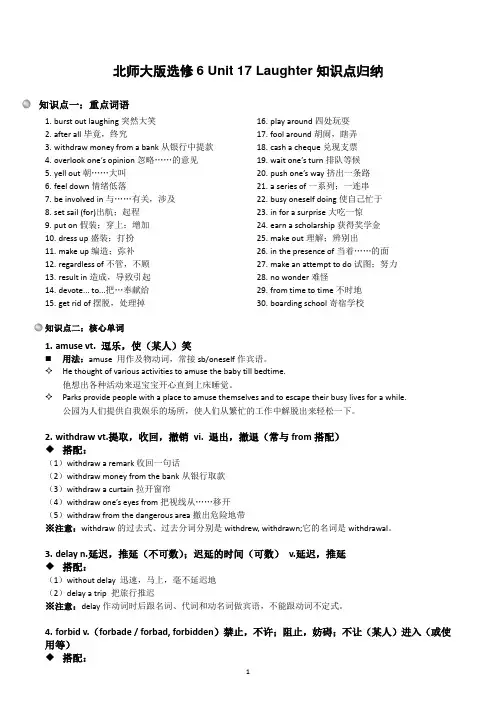
北师大版选修6 Unit 17 Laughter知识点归纳知识点一:重点词语1.burst out laughing突然大笑2.after all毕竟,终究3.withdraw money from a bank从银行中提款4.overlook one’s opinion忽略……的意见5.yell out朝……大叫6.feel down情绪低落7.be involved in与……有关,涉及8.set sail (for)出航;起程9.put on假装;穿上;增加10.dress up盛装;打扮11.make up编造;弥补12.regardless of不管,不顾13.result in造成,导致引起14.devote... to...把…奉献给15.get rid of摆脱,处理掉16.play around四处玩耍17.fool around胡闹,瞎弄18.cash a cheque兑现支票19.wait one’s turn排队等候20.push one’s way挤出一条路21.a series of一系列;一连串22.busy oneself doing使自己忙于23.in for a surprise大吃一惊24.earn a scholarship获得奖学金25.make out理解;辨别出26.in the presence of当着……的面27.make an attempt to do试图;努力28.no wonder难怪29.from time to time不时地30.boarding school寄宿学校知识点二:核心单词1.amuse vt. 逗乐,使(某人)笑⏹用法:amuse 用作及物动词,常接sb/oneself作宾语。
✧He thought of various activities to amuse the baby till bedtime.他想出各种活动来逗宝宝开心直到上床睡觉。
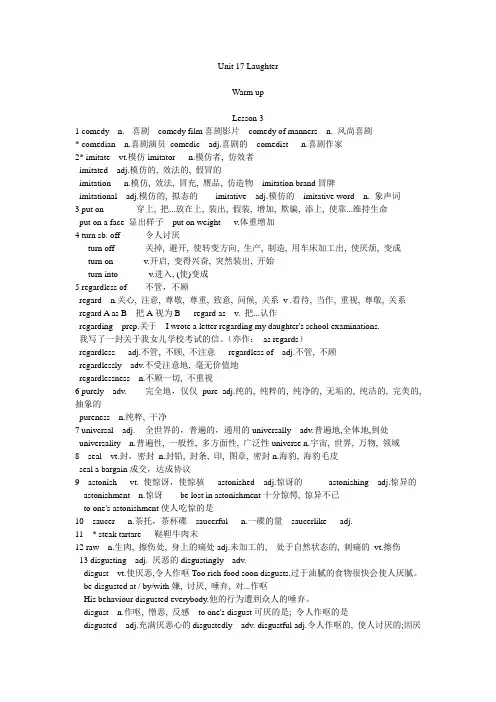
Unit 17 LaughterWarm upLesson 31 comedy n. 喜剧comedy film喜剧影片comedy of manners n. 风尚喜剧* comedian n.喜剧演员comedic adj.喜剧的comedist n.喜剧作家2* imitate vt.模仿imitator n.模仿者, 仿效者imitated adj.模仿的, 效法的, 假冒的imitation n.模仿, 效法, 冒充, 赝品, 仿造物imitation brand冒牌imitational adj.模仿的, 拟态的imitative adj.模仿的imitative word n. 象声词3 put on 穿上, 把...放在上, 装出, 假装, 增加, 欺骗, 添上, 使靠...维持生命put on a face 显出样子put on weight v.体重增加4 turn sb. off 令人讨厌turn off 关掉, 避开, 使转变方向, 生产, 制造, 用车床加工出, 使厌烦, 变成turn on v.开启, 变得兴奋, 突然装出, 开始turn into v.进入, (使)变成5 regardless of 不管,不顾regard n.关心, 注意, 尊敬, 尊重, 致意, 问候, 关系v .看待, 当作, 重视, 尊敬, 关系regard A as B 把A视为B regard as v. 把...认作regarding prep.关于I wrote a letter regarding my daughter's school examinations.我写了一封关于我女儿学校考试的信。
(亦作:as regards)regardless adj.不管, 不顾, 不注意regardless of adj.不管, 不顾regardlessly adv.不受注意地, 毫无价值地regardlessness n.不顾一切, 不重视6 purely adv. 完全地,仅仅pure adj.纯的, 纯粹的, 纯净的, 无垢的, 纯洁的, 完美的, 抽象的pureness n.纯粹, 干净7 universal adj. 全世界的,普遍的,通用的universally adv.普遍地,全体地,到处universality n.普遍性, 一般性, 多方面性, 广泛性universe n.宇宙, 世界, 万物, 领域8 seal vt.封,密封n.封铅, 封条, 印, 图章, 密封n.海豹, 海豹毛皮seal a bargain成交,达成协议9 astonish vt. 使惊讶,使惊骇astonished adj.惊讶的astonishing adj.惊异的astonishment n.惊讶be lost in astonishment十分惊愕, 惊异不已to one's astonishment使人吃惊的是10 saucer n.茶托,茶杯碟saucerful n.一碟的量saucerlike adj.11 * steak tartare 鞑靼牛肉末12 raw n.生肉, 擦伤处, 身上的痛处adj.未加工的, 处于自然状态的, 刺痛的vt.擦伤13 disgusting adj. 厌恶的disgustingly adv.disgust vt.使厌恶,令人作呕Too rich food soon disgusts.过于油腻的食物很快会使人厌腻。

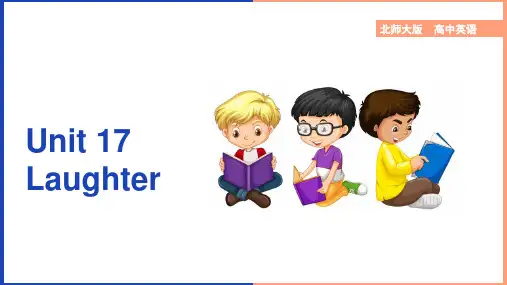
Unit 17Laughter Period Four Communication WorkshopⅠ。
重点单词1.string n. 绳,线2.loaf n。
(面包的)一条3.yawn vi。
打哈欠4.component n. 成分,组成部分5.depth n. 深(度),纵深→deep adj。
深的6.scare vt。
使恐惧→scary adj. 令人恐惧的→scared adj。
惊恐的,担惊受怕的7.starve vi。
挨饿,饿死→starvation n. 饥饿;饿死8.tough adj。
艰难的;不幸的;强壮的,强健的→toughly adv。
固执地;强硬地9.accomplish vt。
取得(成功),完成(任务)→accomplishment n。
成就;完成Ⅱ.核心短语1.get_loose 松开;挣脱;摆脱;爆发2.pick_up 拾起;捡起;接某人3.thanks_to 幸亏;由于4.no_wonder 难怪;不足为奇5.in advance 预先,提前6.lack of 缺少7.come up 出现;走上前来;被提出8.devote..。
to 把……献给Ⅲ。
经典句型1.with复合结构作状语I looked down as much as I could and saw a human creature just six inches high, with_a_bow_and_arrow_in_his_hands。
我尽可能地低下头去,看见一个手拿着弓箭的,仅六英寸高的小人儿。
2.of+名词结构Immediately,I felt at least forty more of_the_same_kind following the first。
很快,跟着第一个,我又感觉到了至少40多个同样的(人).3.(It is/was) no/little wonder “难怪……;……并不出奇”And it_was_no_wonder,_for their doctors,by the Emperor’s order, had put a sleeping drug in with the wine。
Unit 17 Laughter第一部分:英语知识运用(共两节,满分45分)第一节:单项填空(共15小题;每小题1分,满分15分)从A、B、C、D四个选项中,选出可以填入空白处的最佳选项。
1. Mr. Wang’s daughter doesn’t want to go to Thailand this summer because she went there ______ the last trip.A. inB. onC. aroundD. to2. We came to a house, in front of which sat a small boy, who ______ a branch.A. has cutB. had cutC. has been cuttingD. had been cutting3. The law requires equal treatment for all, ______ race, religion or sex.A. regardless ofB. apart fromC. in spite ofD. according to4. The scientist ______ at the medical conference comes from Zhejiang University.A. spokeB. speakingC. spokenD. speaks5. It was the driver’s carelessness that ______ the terrible car accident.A. resulted fromB. ledC. resulted inD. happened6. Some comedians are good at ______ different people’s voices.A. putting onB. putting upC. putting downD. putting off7. You can’t imagine what trouble I had _____ this English article into Chinese.A. to translateB. translatedC. translatingD. been translating8. Some leaders’ long and boring speech really turn the listeners ______.A. onB. offC. downD. over9. He opened the door only to find many teachers ______ at the back of the classroom.A. seatingB. seatedC. were seatingD. seat10. I know nothing about him ______ he has been abroad for several years.A. except whenB. except thatC. exceptD. besides11. He ______ an attempt to climb the tower but failed.A. madeB. tookC. didD. tried12. His stepmother is kind to him, ______ whom she has a deep love.A. withB. atC. ofD. about13. His intelligence more than ______ his lack of experience.A. passes throughB. gets rid ofC. does withD. compensates for14. Let’s take ______ ten-minute break and have ______ drink of water.A. a; aB. the; 不填C. 不填; aD. 不填; the15. — What ______ you to come to the party?— An unexpected accident ______ me going.A. prevented; forbadeB. protected; forbadeC. forbade; preventedD. stopped; kept第二节:完形填空(共20小题;每小题1.5分,满分30分)阅读下面短文,掌握其大意,然后从16-35各题所给的四个选项(A、B、C和D)中,选出最佳选项。
One of Canada’s most famous physicians was Dr. William Osler. His friends remember the day when he was working in one of Britain’s 16 during the war. He was 17 to be given an unexpected message ― his own son had been 18 on the field of battle.Very 19 as he was at the news, he still came back to his work. Afterwards he was noticeably different. Those who 20 him best said that he had changed as a 21 since that day. The 22 tone was gone from his voiceand never again did his friends hear the songs which he often sang as he went from ward (病房) to ward.Though these things 23 returned, something finally came to 24 their place. Everyone noticed new compassion (同情) in his care of the soldiers who each day streamed in 25 the battlefield. Before, he had professional 26 for the patients; now there was a(n) 27 note of a personal compassion, like that of a father for his son.Osler was understandably hurt and, like most people who have experienced such 28, he was most likely to become 29. In time, after working through pain and anger, he found a way to 30 himself. He chose not to let his son’s death turn him into a(n) 31 man. He channeled it into 32 and love for others, caring for them as he would care for his son. Helen Keller wisely said, “The 33 of life is one of our greatest blessings. It makes us 34 and helpful. Although the world is full of suffering, itis also full of the overcoming of it.” Osler 35 us something about overcoming suffering.16. A. schools B. hospitals C. factories D. colleges17. A. called back B. called on C. called for D. called out18. A. killed B. praised C. reported D. wounded19. A. frightened B. surprised C. sad D. pleased20. A. described B. liked C. recognized D. knew21. A. husband B. physician C. loser D. patient22. A. cheerful B. peaceful C. harmful D. successful23. A. ever B. always C. never D. often24. A. lose B. spare C. reach D. take25. A. on B. from C. by D. at26. A. concern B. hunt C. vote D. desire27. A. chosen B. fixed C. added D. mixed28. A. heat B. losses C. failures D. poverty29. A. excited B. angry C. happy D. satisfied30. A. forgive B. warn C. comfort D. enjoy31. A. bitter B. attractive C. strong D. proud32. A. thanks B. hate C. regret D. energy33. A. present B. struggle C. fortune D. way34. A. pleasant B. polite C. patient D. honest35. A. promises B. informs C. signals D. teaches第二部分:阅读理解(共20小题;每小题2分,满分40分)阅读下列短文,从每题所给的四个选项(A、B、C和D)中,选出最佳选项。
AI stared out of the window, remembering how I grew up. I did everything carefully in the hope of hearing a word of praise from her, but only got rules and expectations I could never live up to (达到). I remembered the years she made me get up at six every morning to cook breakfast for the family before leaving for school. I remembered the parties, dances, and after-school sports I missed because she didn’t approve of (赞成) them. Most of all, I remembered the times she’d compared me to other girls of my age and found me lacking.My mother, sitting in a chair by the fireplace, looked down at her sewing and said, “Nothing was ever good enough for my mother. I was glad to leave her when I married your father. Well, it’s too late to tell her now, and she wouldn’t understand anyway. And I know she did love me, even if she never said so. If she didn’t, she wouldn’t have cared whether I did the housework correctly or not.”I was too shocked to speak. My mother had never started a serious conversation with me. It was always lectures about my attitude, clothes, and hairstyle; about how I’d have to control my anger in order to be a good wife.Through generations of disease and war, women had taught theirdaughters what they needed to know in order to survive: how to cook, clean; how to be productive, respectful, and patient. But as a teenager, I found it hard to take these lessons as evidence of love.“I told you this story for a reason,” my mother continued. “Yes, I have many children, and I love them all. But you are my first child, the first in everything to me. I’ve been very strict and hard on you, but I raised you in the only way I knew how. I am proud of you.”36. In the eyes of the mother, the author _____.A. is a poor cookB. is her prideC. should be a waitressD. should not continue her studies37. From the second paragraph, we know the author’s mother is talking about _____.A. what a good girl is likeB. what a good mother is likeC. what she thinks of the authorD. what her Mom was like when she was young38. Ac cording to the passage, we can describe the author’s mother as a _____ woman.A. curiousB. talkativeC. responsibleD. warm-hearted39. Which of the following is TRUE according to the passage?A. The author is the only child in her family.B. The author had tried to live up to her mother’s expectations.C. The author has nothing in common with her mother.D. The author is not particular about clothes.BEveryone feels left out by friends once in a while, and sometimesfriends fight and make up again. But sometimes kids form groups that they won’t let other kids belong to. A clique is a group of kids who hang out together and won’t let others join in.Not all groups of friends are cliques. The thing that makes a group a clique is that they leave some kids out on purpose. Usually one or two popular kids control who gets to be in the group and who gets left out. Kids may act much differently than they did before they were part of the clique. For instance, Zack, Trevor and Steve always played basketball after school, but Zack started pushing Trevor out of the group, and Steve admitted that.Kids might form cliques late in elementary school or in middle school. Sometimes cliques are made up of kids who share an interest in something, like sports or music. Sometimes the kids in them just want to be popular or want to belong. Both boys and girls have cliques, though people who study these groups say girl cliques are often meaner and more hurtful in the way they treat girls who aren’t in the group. If you are on the outside of a clique, it really hurts. Emotional hurt is different to the kind of hurt you feel when you skin your knee, but it’s also a kind of pain and you can feel terrible. You might feel lonely if you’re alone at lunch or after school.Parents and teachers can help when someone is being left out. They might help by letting kids know that it isn’t OK to treat others in this way, or by putting an end to the mean treatment.40. Which of the following is TRUE according to the passage?A. Kids of the same age usually form a clique.B. Members of a clique are usually from rich families.C. Members of a clique are often unfriendly to people who aren’t in the group.D. One or two adults are usually in charge of a clique.41. We can learn from the passage that kids in a clique _____.A. are mostly boysB. may share the same interestC. want to become popular movie starsD. may feel lots of anger towards their parents42. What is the author’s opinion of cliques?A. It is a way to enjoy friendship.B. They may hurt someone’s feelings badly.C. They are natural and common, so adults should accept it.D. People in a clique encourage good teamwork and communication.43. The author suggests that _____.A. kids in a clique help each otherB. boys and girls should be treated equally in a cliqueC. teachers and parents help kids of similar interests to form a cliqueD. teachers and parents help to persuade the kids not to form cliquesCRansom Myers of Dalhousie University in Nova Scotia warned, using solid science and careful analysis, of the dangers of overfishing. He didn’t mince words and he wasn’t afraid to report bad news. As the Guelph Mercury reported, the 54-year-old biologist, originally from Mississippi, was known for his research and warnings about the extinction of marine life around the world.He developed a passion for marine protection during his days in St. John’s, Newfoundland, Canada, where he worked for the Department of Fisheries and Oceans at a time when the industry was watching the collapse of the cod (鳕鱼) fishery. He became, says the Guelph Mercury, a lone, unpopular voice in the discussion about the cause of the collapse, insisting overfishing was the main factor. The world was spending its energy fighting over the few fish left instead of cutting catch limitsbefore it was too late.He warned governments, the fishing industry and consumers, that unless commercial fishing was reduced, many large marine species would become extinct, leading to economic disruptions, food shortages, and lasting damage to marine ecosystems. He said his conclusions were shocking because people had lost sight of the true effect of the declines and they did not look back far enough in history. In other words, he said, “We’ve forgotten how big fish used to be and how many of them once lived in the sea.”44. Ransom Myers was known for his scientific work in _____.A. physicsB. chemistryC. biologyD. economics45. The underlined senten ce “He didn’t mince words” in Paragraph 1 probably means “_____”.A. He always kept his promisesB. He was spoken highly of by his workmatesC. He was not good at giving lecturesD. He said exactly what he thought46. Which of the following is NOT true about Ransom Myers?A. He became interested in marine protection when the cod fishery was in danger of collapse.B. He wrote a book about the history of marine protection.C. He suggested that commercial fishing should be reduced.D. Many people turned a deaf ear to his warnings about the dangers of overfishing.47. According to Ransom Myers, the reason why people found his conclusions shocking was that _____.A. they didn’t have a good knowledge of the living habits of fishB. they could still catch a great many big codC. they didn’t know the great differences between the present and thepast marine fisheryD. they thought his research was not based on a detailed analysisDThe best way to teach your children how to be responsible pet owners is to be one yourself. This should start before you even get a pet —make sure you have realistic expectations about pet ownership. And take steps to select the right animal for your family at the right time.As soon as you bring a pet into your family, set up rules regarding proper pet care. For example, tell your children not to pull the animal’s tail, ears, or other body parts, and insist that they never hit or run after the pet. Teach children how to properly pick up, hold, and pet the animal. These simple lessons can help kids become responsible owners. Although certain pet-care activities must be handled by adults, you can still include your children by explaining why and what you’re doing. For example, when you take your pet to the veterinarian, explain to your children how the operation can make your pet healthier and calmer. Also allow your children to take part in pet-training activities, which not only make your pet a more well-mannered family member, but also teach your child humane treatment and effective communication.What’s more, your children will study how you feed, pet, and exercise your family pet. And they’ll pay close attention to what you do when a pet scratches (抓) the furniture or barks excessively (过分地). Frustrating as these problems are, “getting rid of” the pet isn’t fair to the pet and your children. When faced with pet problems, get to the root of the problem. Often a veterinarian, animal professional, or dog trainer can help you solve pet problems so you can keep the whole family together.48. The second paragraph mainly tells us _____.A. things for kids to keep in mind about pet careB. why some children like playing with petsC. how kids can behave properly at homeD. how to feed a pet at home49. Why should you ask your children to join in your pet-care activities?A. They can help you to calm the pet down.B. They can learn how to operate on pets.C.They will learn how to get along well with pets.D.They can catch hold of the pet if it tries to run away.50. If you run into difficulties in raising a pet, you should _____.A. ask experts for adviceB. send the pet to a zooC. have a discussion with your childrenD. get rid of the pet as soon as possible51. We can know from the passage that _____.A. adults should set a good example to children in keeping petsB. children’s studies will be affected if they pay too much attention to pet careC. children are unlikely to take good care of petsD. pet food costs quite a lot of moneyEEach year more than three million people become infected with malaria (疟疾). At least one million die, mostly young children and pregnant (怀孕的) women in Africa. Malaria is also a problem in Asia and South America. The parasites (寄生虫) that cause malaria enter people’s blood when they are bitten by the mosquitoes. The parasites travel to the liver (肝脏) where they divide and grow. After a week or two, they enter red blood cells and reproduce thousands of times. They can destroy major organs.People die from malaria because they are not treated or treatment is too late. Drugs can prevent the parasites from developing in the body.But experts still say the best way to prevent malaria is not to be bitten by a mosquito.Their advice could change in the future with the help of mosquitoes genetically engineered to block the development of the parasite. In other words, they will not be able to spread the disease. Computer studies show that if malaria control is to succeed, insects like these are needed to replace mosquitoes in the wild.Researchers at Johns Hopkins University put equal numbers of malaria-resistant (抗疟疾的) mosquitoes in a box with other mosquitoes. The insects mated, and all of them fed on mice infected with the malaria parasite. The researchers took eggs produced by the mosquitoes and kept them until they became adult mosquitoes. These insects were then permitted to feed on infected mice. The researchers did this again and again. After nine generations, seventy percent of the mosquitoes weremalaria-resistant. Earlier studies showed that disease-resistant mosquitoes would die early and not be able to replace wild ones. But in the new research, the scientists say they developed stronger mosquitoes. In any case, malaria- -resistant mosquitoes might still need to be used in combination with drugs and insect poisons to control the disease. 52. Which of the following is NOT mentioned in the passage as a way to prevent malaria?A. Trying to avoid mosquito bites.B. Developing malaria-resistant mosquitoes.C. Using drugs.D. Moving to another place to live.53. The underlined word “block” in the fourth paragraph can be replaced by “_____”.A. preventB. studyC. encourageD. separate54. Which of the following statements is TRUE?A. Some researchers are developing malaria-resistant mosquitoes in case they get infected.B. Malaria can be completely controlled by developing malaria-resistant mosquitoes.C. Mice in the wild can eat a great many mosquitoes.D. Every year lots of people die from malaria in Africa.55. Which of the following is the best title for the passage?A. Researchers work on malaria-resistant mosquitoesB. Malaria in Africa, Asia and South AmericaC. How parasites reproduceD. Malaria — a serious threat to public health第三部分:写作(共两节,满分35分)第一节:短文改错(共10小题;每小题1分,满分10分)It was fine in April 8, 2007. That day all the students56. ________________in our class went to plant tree. On arriving at our destination 57. ________________at 8 o’clock, the teacher asked each of us plant at leas t58. ________________five trees. Then we set about digging, planting and watering.59. ________________All of us tried hardly to finish our task, afraid of falling behind.60. _______________Our monitor set good example to us. In spite of his illness,61. ________________he accepted his task and finish it ahead of time. Then he62. ________________went on to help others. After a while, she was wet all over.63. ________________He looked pale, but he was full of joy. Look at the64. _________________young trees, we smiled pleasantly, forgetting our tired.65. ________________第二节:书面表达(满分25分)根据下面所给的提示,用英语写一篇120词左右的短文。